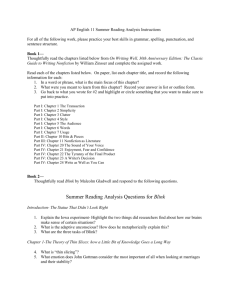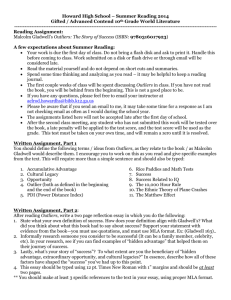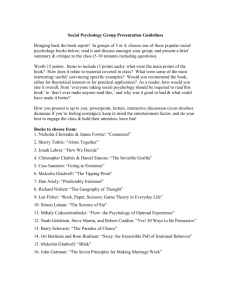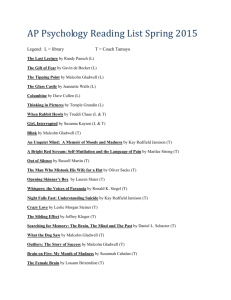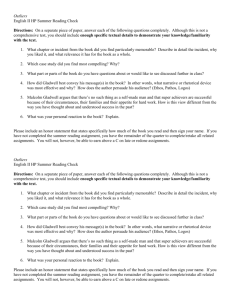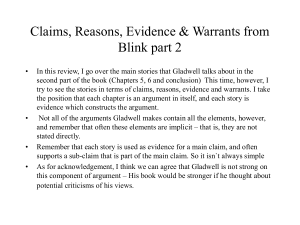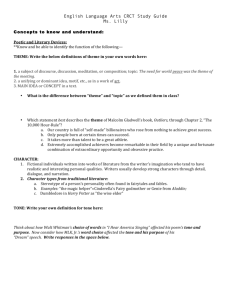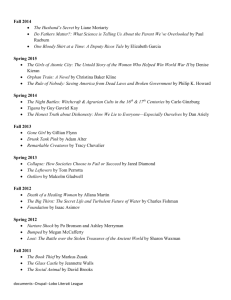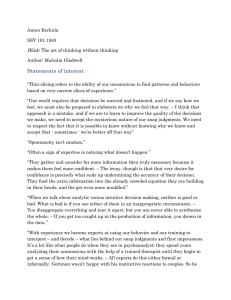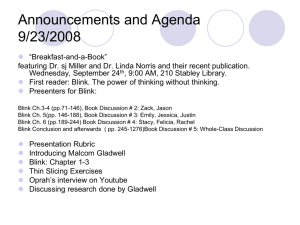Chapter 1 - Scott Warrick
advertisement
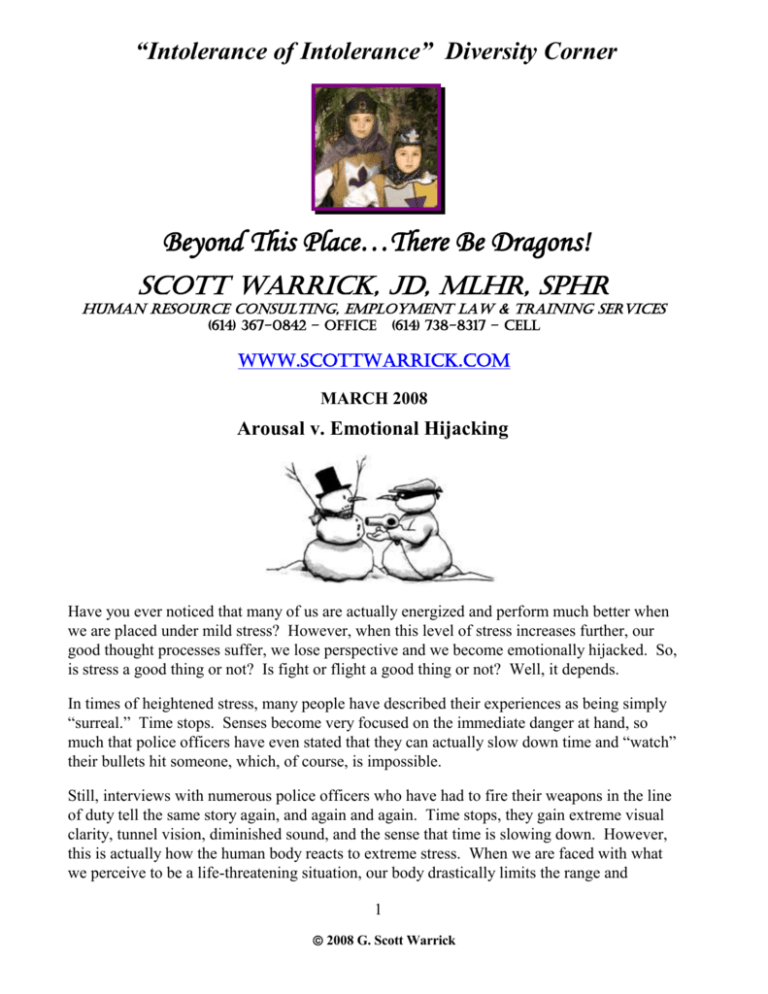
“Intolerance of Intolerance” Diversity Corner Beyond This Place…There Be Dragons! Scott Warrick, JD, MLHR, SPHR HUMAN RESOURCE CONSULTING, EMPLOYMENT LAW & TRAINING SERVICES (614) 367-0842 – Office (614) 738-8317 – Cell www.scottwarrick.com MARCH 2008 Arousal v. Emotional Hijacking Have you ever noticed that many of us are actually energized and perform much better when we are placed under mild stress? However, when this level of stress increases further, our good thought processes suffer, we lose perspective and we become emotionally hijacked. So, is stress a good thing or not? Is fight or flight a good thing or not? Well, it depends. In times of heightened stress, many people have described their experiences as being simply “surreal.” Time stops. Senses become very focused on the immediate danger at hand, so much that police officers have even stated that they can actually slow down time and “watch” their bullets hit someone, which, of course, is impossible. Still, interviews with numerous police officers who have had to fire their weapons in the line of duty tell the same story again, and again and again. Time stops, they gain extreme visual clarity, tunnel vision, diminished sound, and the sense that time is slowing down. However, this is actually how the human body reacts to extreme stress. When we are faced with what we perceive to be a life-threatening situation, our body drastically limits the range and 1 2008 G. Scott Warrick amount of information the brain allows to enter. Our brain greatly limits the degree of awareness we have of our environment in order to intensify our focus on the immediate danger. (“Blink,” by Malcolm Gladwell, pages 224-228) According to Lt. Col. Dave Grossman, author of “On Killing,” a book which examines the psychological affects killing, says that the optimal state of “arousal,” which is the psychological state at which our stress level actually improves our performance, occurs when our heart rate rises to somewhere between 115 and 145 beats per minute. Grossman uses basketball superstar Larry Bird as an example of this heightened state of focus. Byrd used to say that at critical moments in the game, the court would go quiet and the players would seem to be moving in slow motion. When this happened, Byrd was clearly operating at an “optimal range of arousal,” which meant his heart rate would rise and settle somewhere between the 115 and 145 beats per minute range. However, very few basketball players were able to see the court as clearly as Larry Bird did, and that’s because very few people are able to play in that optimal range. (“Blink,” by Malcolm Gladwell, pages 224-228) Unfortunately, Grossman says that most of us get too aroused when we are placed under pressure and pass a certain point. “After 145,” Grossman says, “bad things begin to happen. Complex motor skills start to break down. At 175, we begin to see an absolute breakdown of cognitive processing…The forebrain shuts down, and the mid-brain – the part of your brain that is the same as your dog’s (all mammals have that part of the brain) – reaches up and hijacks the forebrain. Have you ever tried to have a discussion with an angry or frightened human being? You can’t do it…You might as well try to argue with your dog.” (“Blink,” by Malcolm Gladwell, pages 224-228) In sum, when our heart rates exceed the 145 beats per minute range, our blood will rush into our core muscle mass, so we become emotionally hijacked since our brains focus almost exclusively at the immediately perceived threat, so our behavior becomes inappropriately aggressive. According to Grossman, this is precisely the reason why so many police departments in recent years have banned high-speed chases. Police departments are not limiting these high speed chases solely because of the danger of hitting an innocent bystander, but these chases are being limited also largely because of what happens after the chase ends. Pursuing a suspect in a high speed chase is exactly the kind of activity that pushes police officers into this dangerously high state of arousal. (“Blink,” by Malcolm Gladwell, pages 224-228) “The L.A. riot was started by what cops did to Rodney King at the end of the high-speed chase,” says James Fyfe, head of training for the NYPD, who has testified in many police brutality cases. “The Liberty City riot in Miami in 1980 was started by what the cops did at the end of a chase. They beat a guy to death. In 1986, they had another riot in Miami based on what cops did at the end of the chase. Three of the major race riots in this country over the past quarter century have been caused by what cops did at the end of a chase.” (“Blink,” by Malcolm Gladwell, pages 224-228) 2 2008 G. Scott Warrick “When you get going at high speeds, especially through residential neighborhoods, that’s scary,” says Bob Martin, a former high-ranking LAPD officer. “Even if it is only fifty miles per hour. Your adrenaline and heart start pumping like crazy. It’s almost like a runner’s high. It’s a very euphoric kind of thing. You lose perspective. You get wrapped up in the chase. There’s that old saying – ‘a dog in the hung doesn’t stop to scratch its fleas.’ If you’ve ever listened to a tape of an officer broadcasting in the midst of pursuit, you can hear it in the voice. They almost yell. For new officers, there’s almost hysteria. I remember my first pursuit. I was only a couple of months out of the academy. It was through a residential neighborhood. A couple of times we even went airborne. Finally we captured him. I went back to the car to radio in and say we were okay, and I couldn’t even pick up the radio, I was shaking so badly.” Martin says that the King beating was precisely what one would expect when two parties – both with soaring heartbeats and predatory cardiovascular reactions – encounter each other after a chase. “At a key point, Stacey Koon,” one of the senior officers at the scene of Rodney King’s arrest, “told the officers to back off,” Martin says. “But they ignored him. Why? Because they didn’t hear him. They had shut down.” (“Blink,” by Malcolm Gladwell, pages 224-228) According to Dr. Keith Payne, Assistant Professor of Psychology at the University of North Carolina, we become temporarily autistic in such situations. In short, we simply shut down and focus only the immediate task at hand ... blocking out all other external stimuli. Perspective abandons us, which can create a very dangerous situation. (“Blink,” by Malcolm Gladwell, pages 232) Spotting an emotional hijacking is easy. The person usually says something like, “I just don’t know what came over me.” When this happens, our amygdala has won. At that point, our amygdala is controlling our actions and not our frontal lobes ... and bad things usually happen. (An exception an emotional hijacking as being a bad thing is uncontrollable laughter. Since the amygdala is the trigger point for our emotions, and since laughter is one of our strongest emotions, the source of our laughter comes from this region of the brain as well. Remember: The amygdala controls all of our emotions … good and bad. Uncontrollable laughter is a very good type of emotional hijacking, which release endorphins into the body, which is a chemical that is strong as “morphine” with healing properties. It is from the endorphins being released into our bodies where we get the proverbial “runner’s high.”) However, it is important to note that our emotions and ego are not bad things. We want to be excited about our work and our causes, which comes from emotion. This is how we get into a state of “FLOW” in our work. We also want to have self-confidence and high-self esteem, which gives us the courage to try new things. Consequently, both ego and emotions are very good things … but not if you cannot control them. 3 2008 G. Scott Warrick Think of it this way: Is a car a good thing? Yes, of course ... but what if you can’t control it? When you cannot control your ego and emotions you are out of control, which makes you very dangerous to yourself and others. You cannot be an Emotionally Intelligent Communicator if you cannot keep your emotions and ego in balance with your logical brain. Discussion Questions Have you ever felt your heart rate reaching 145 beats per minute? What do you do at that point? Have you ever been temporarily autistic ... where everything just slows down to the point that the experience becomes surreal? What should you do when you feel your blood pressure rise to such critical stages? What do you think Michael Richards (“Kramer) wishes he had done as he became more and more agitated with the African American hecklers in his audience? For More Information, Go To: www.scottwarrick.com © 2008 G. Scott Warrick 4 2008 G. Scott Warrick
